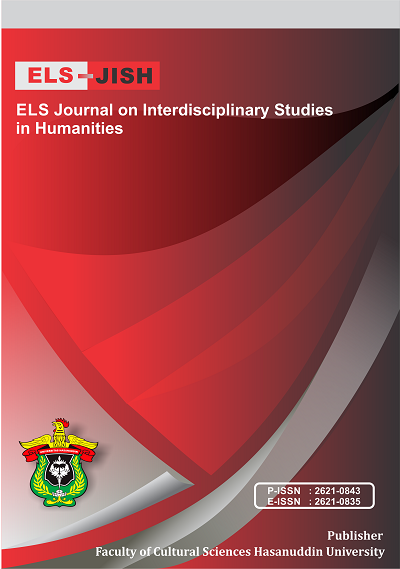Character Discrimination Analysis in the Novel Maryam by Okky Madasari
DOI:
https://doi.org/10.34050/elsjish.v5i2.21062Keywords:
Ahmadiyah, Discrimination, Fulthoni, NovelAbstract
This study analyzes the types of discrimination that occur in the main character Maryam who was born as an Ahmadiyah adherent in the novel Okky Madasari. The formulation of the problem from this research is, what are the elements that cause discrimination against the character Maryam and what are the types of discrimination. The method that the researcher considers qualified to assist this research is the descriptive-qualitative method. This type of discrimination analysis uses Fulthoni's theory, which explains the types of discrimination from ethnicity, race, and religion/belief to gender and gender issues (social roles due to gender), and reveals the elements of discrimination that the author uses. new structural theory. Talking about the scope of social life, we will be carried away in various complex behaviors in society, which are formed in the dimensions of life and can be observed and traced to capture human existence. In Okky Madasari's novel Maryam, the main character Maryam experiences various life conflicts in the form of discrimination. The emergence of this discrimination is the result of the birth of Maryam's character as Ahmadiyah which is seen as a deviant sect by the community.
References
Damono, S. D. (1984). Sosiologi sebuah pengantar ringkas. Jakarta: Departemen Pendidikan dan Kebudayaan, Retrived on August 2021, http://repositori.kemdikbud.go.id/2385/
Diana Sari, S., Zakka Arizal, N., & Budiono, A. (2021). Honesty as the Fundamental Basis of Legal Education: A Study and Critique on “Freedom to Learn” Educational Policy. (June 13, 2021). The 3rd International Conference on Education and Social Science Research (ICESRE 2020) Universitas PGRI Semarang, Indonesia – 14 November 2020.
Fulthoni, (2009). Memahami Diskriminasi. Jakarta: The Indonesian Legal Resouree Center (ILRC).
Kosasih, K. (2019). Independent and creative: Learning from Finnish retirement and art activities for the future of Southeast Asia’s retirement, https://aaltodoc.aalto.fi/bitstream/handle/123456789/38762/master_Kosasih_Karina_2019.pdf?sequence=1&isAllowed=y
Lambert, V. A., & Lambert, C. E. (2012). Qualitative descriptive research: An acceptable design. Pacific Rim International Journal of Nursing Research, 16(4), 255-256.
Liliweri, A. (1994). Prasangka Sosial dan Komunikasi Antaretnik. Prisma. Temprint, Jakarta.
Lubis, F. W. (2018). Analisis Diskriminasi Pada Novel “Amelia” Karya Tere-Liye. Journal of science and social research, 1(1), 53-59.
Morse, N. B., Pellissier, P. A., Cianciola, E. N., Brereton, R. L., Sullivan, M. M., Shonka, N. K., ... & McDowell, W. H. (2014). Novel ecosystems in the Anthropocene: a revision of the novel ecosystem concept for pragmatic applications. Ecology and Society, 19(2).
Munanto, S., & Rahima, A. (2020). Watak Tokoh Protagonis dalam Novel Perang Karya I Gusti Ngurah Putu Wijaya. Aksara: Jurnal Ilmiah Pendidikan Bahasa dan Sastra Indonesia, 4(1), 103-110.
Rahman, F. (2017). The revival of local fairy tales for children education. Theory and Practice in language Studies, 7(5), 336.
Rahman, F. (2017, December). Literary Translation and Cultural Transformation. In Conference: The 2nd Annual Seminar on English Language Studies at: Aula Mattulada FIB UNHAS, Makassar-IndonesiaVolume (Vol. 1).
Rumagit, S. K. (2013). Kekerasan dan diskriminasi antar umat beragama di Indonesia. Lex Administratum, 1(2).
Sukmawaty, Rahman, F.F., Andini, C. (2022). Covid-19 Pandemic and Axiology of Communication: A Study of Linguistic Phenomena. IJISRT,7(4), 1079-1087.
Sukmawaty, Rahman, F.F., Andini, C. (2022). The Shift of Honorifics due to The Promotion As A Government Official: Comparative Study. ELS Journal on Interdisciplinary Studies in Humanities, 5(1), 166-176.
Subroto, P. (2007). Financing education sector under the current decentralized system in Indonesia: Disparities in education expenditures per student at public junior secondary schools (Doctoral dissertation, University of Pittsburgh). https://dergipark.org.tr/en/pub/ijere/article/628359
Sungkowati, Y. (2019). Arek Culture In Literary Works. In Journal International Seminar on Languages, Literature, Arts, and Education (ISLLAE) (Vol. 1, No. 1, pp. 163-168).
Downloads
Published
How to Cite
Issue
Section
License
Copyright (c) 2022 Somadi Sosrohadi, Diana Wulandari

This work is licensed under a Creative Commons Attribution-NonCommercial-ShareAlike 4.0 International License.






